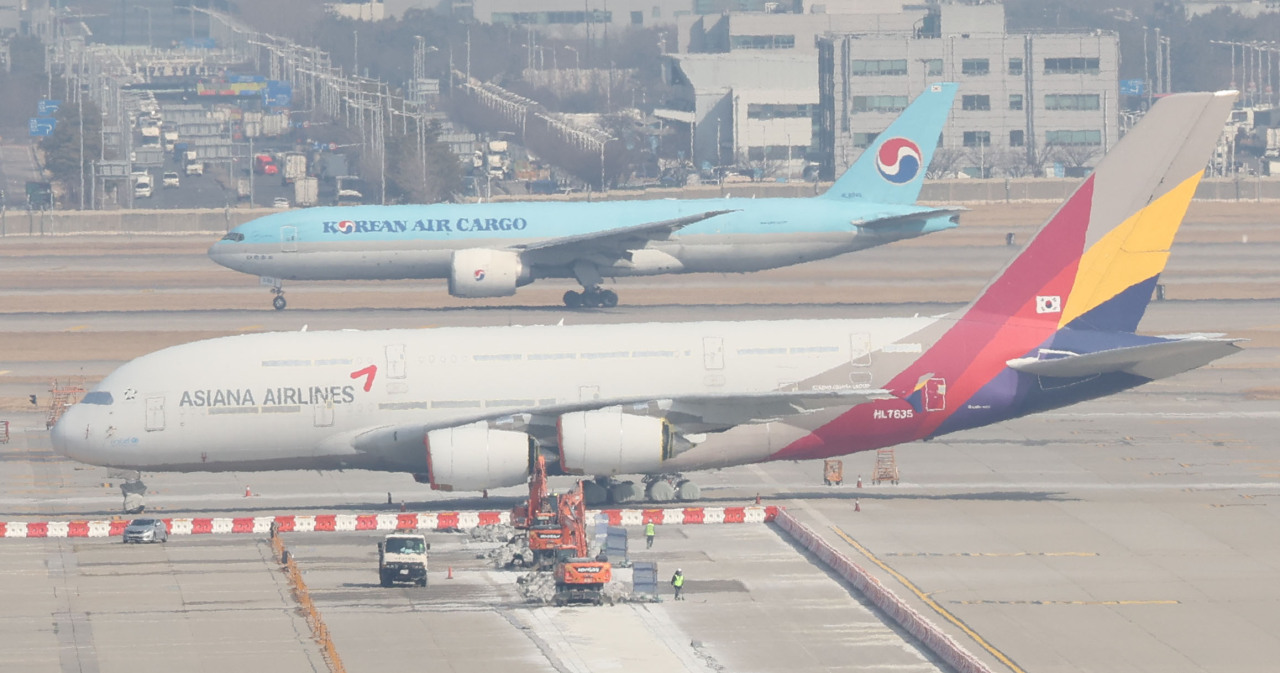 |
Korean Air and Asiana Airlines airplanes are parked at Incheon Airport on Tuesday. (Yonhap) |
The South Korean antitrust regulator granted a conditional approval on Tuesday for a merger between South Korea’s two biggest air carriers to prevent monopoly in the country’s aviation industry.
The Fair Trade Commission’s decision was made after concluding that Korean Air’s acquisition of Asiana Airlines might limit competition.
After the merger, the two air carriers would operate around 48.9 percent of international flights from South Korea and 62 percent of domestic flights.
The FTC found that it would likely also cause ticket prices to increase, especially for their flights to North America, Europe, China, Southeast Asia, and to Jeju Island.
As condition for the approval, the FTC ordered them to give up some of their airport slots and transportation rights of certain regions.
To comply with the order, Korean Air and Asiana Airlines will have to give up some allotted slots for routes in which they have more than 50 percent of the market share and the same for transportation rights.
The exact number of slots and transportation rights they would have to give up will later be decided by the FTC and the Transport Ministry.
Such measures will take effect when the merger is finalized and will last for the next 10 years.
Taking into account that the airlines would need some time to make adjustments and implement the measures, the FTC will in the meantime, prohibit an increase of ticket prices and reduction of the number of seats sold.
Even with the FTC’s approval, Korean Air still needs clearance from six other regions including the US, the EU, Japan, China, the UK, and Australia.
The EU and China are the two biggest obstacles in the airline’s bid as the EU’s regulatory body has been getting tougher over business mergers and China continues to be very conservative in airport slots and transportation rights distribution.
Prior to the FTC’s approval, Korean Air had received business acquisition approvals from Singapore, Turkey, Taiwan, Vietnam, Thailand, Malaysia, New Zealand, and the Philippines.
The antitrust regulator expects the conditional approval of the merger between South Korea’s two biggest airlines to offer local low-cost carriers an opportunity to add new mid- to long-range routes to Southeast Asia and China, and increase benefits for customers.
The conditional approval came a year after the regulator started to review Korean Air’s attempt to buy a majority stake in Asiana Airlines.
In November 2020, Korean Air inked a deal to buy a 63.88 percent stake in its longtime rival Asiana Airlines for 1.8 trillion won ($1.51 billion).
Korean Air is the world’s 18th-larget carrier by fleet. The acquisition of the cash-strapped air carrier is expected to make Korean Air the world’s 10th largest.
Korean Air plans to form an integrated company with Asiana in 2024.
By Hong Yoo (
yoohong@heraldcorp.com)






![[Out of the Shadows] Seoul room clubs offer drugs to compete for clientele](http://res.heraldm.com/phpwas/restmb_idxmake.php?idx=644&simg=/content/image/2024/11/05/20241105050566_0.jpg)

